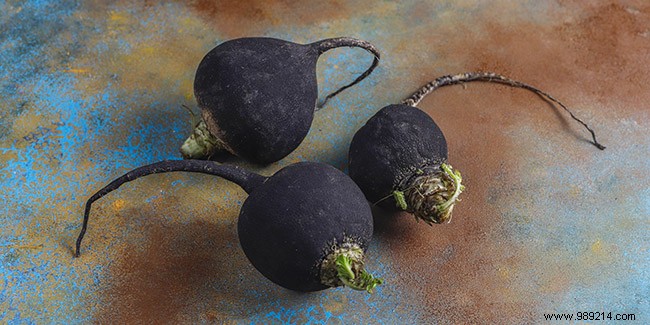
Black radish, far less common than the familiar pink summer variety, boasts rough, dark skin that verges on black. This sizable taproot from a herbaceous plant reaching up to one meter tall delivers a potent aroma and crisp white flesh. Originating in China, it's considered humanity's first cultivated radish, with depictions on Egypt's Karnak Temple walls from pharaonic eras—where it even served as currency. Ancient Romans applied black radish oil for skin conditions, while Greeks used it to combat hemorrhages and coughs.
Introduced to Western Europe, including France, in the 18th century, black radish was prized both at the table and for its therapeutic qualities. It outshone pink radish until the 20th century, when the latter surged in popularity. Today, its medicinal virtues continue to draw health-conscious consumers.
Enjoy black radish raw, cooked, or juiced. Per 100 grams, it provides just 20 kcal, yet packs 6-23 mg of vitamin C, antioxidants, and 54 mg of calcium. Its sulfur-rich essential oil, including glycosides and raphanin, offers antibacterial and antiseptic effects, alongside other organic compounds that support detoxification.
Black radish excels at supporting a sluggish liver, enhancing toxin elimination from the liver, pancreas, and gallbladder into the intestines. Its sulfur compounds also act as a diuretic, cleansing the kidneys, reducing kidney stone risk, and warding off gout. Consume it occasionally after heavy meals or at winter's end for optimal results.
With antibacterial and antifungal properties plus ample vitamin C to bolster immunity, black radish fights infections effectively. Just 100 grams covers 8% of an adult's daily vitamin C needs. It also aids in expelling bronchial phlegm during productive coughs.
Studies from 2010 and 2014 highlight how isothiocyanates in black radish target and destroy certain cancer cells, underscoring its promising role in prevention.
Mexican researchers found black radish juice lowered blood lipids and bile cholesterol in mice after six days, further reducing blood cholesterol and triglycerides while boosting HDL. Though not yet human-tested, these results are encouraging for heart health.
Available as drinkable ampoules, total powder, or blended with other herbs in herbal sections, black radish suits home juicers too. For fresh juice, take 15 ml, 2-6 times daily based on symptoms, not exceeding four weeks.
Prolonged intake may cause heartburn or digestive upset. Limit juice to four weeks and mix with vegetable oil to protect stomach lining. Avoid if you have biliary obstruction or migrating kidney stones. Discontinue immediately for allergies and consult a doctor. Reduce or stop if irritation occurs.